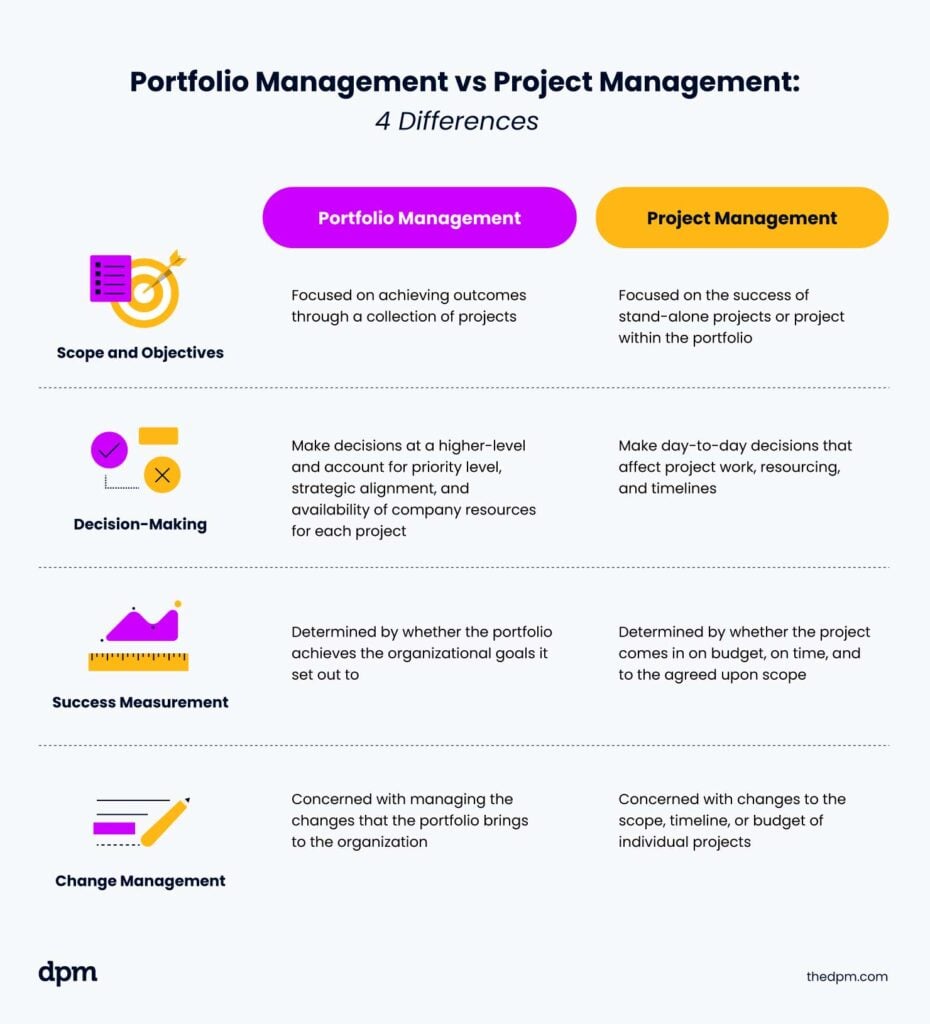Portfolio management vs project management: while both are key techniques in the project management discipline, they differ in their scale, scope, and tactics for achieving business goals.
In this article, I'll discuss the key differences between project portfolio management (PPM) and project management so that you can decide which approach is best for you.
What Is Portfolio Management?
Project portfolio management is a set of techniques for managing a collection of projects. It’s also referred to as simply portfolio management.
Whereas program management involves managing a group of related projects or projects that inform each other, projects in a portfolio are not necessarily related (although they could be). Portfolios can consist of various projects such as new product development, marketing campaigns, or even IT initiatives.
Portfolio managers, often as part of a project management office (PMO), conduct centralized management, ensure an organization’s projects are aligned with the company’s strategy and specific objectives, and ensure that each project in the portfolio is properly resourced and managed.
Find out more about program management vs project management.
Why Companies Use Portfolio Management
There are several reasons why companies might choose to use portfolio management:
- They want to better align their projects with strategy, optimize available resources across the organization, or simply improve their project selection process so they’re focusing on the right projects. It offers a big picture view for both leadership and the project teams involved.
- Portfolio management can also help companies with prioritizing and tracking initiatives, giving a high-level view into the milestones and overall progress of key projects and deliverables and offering accountability.
- Additionally, analysts may use portfolio management to assess organizational health by analyzing a company’s project mix and execution performance metrics.
Portfolios are usually managed with project portfolio management software or apps.
What Is Project Management?
By contrast, project management is the process of managing a single project throughout the project life cycle. A project manager is responsible for ensuring that a project is completed on time, within budget, and to the required standards.
While project management is used for one-off projects, such as building a new factory or launching a new product, it’s built on task management and real-time dependencies that may challenge the planned outcome.
Project management software and other project management tools can be used to optimize efforts and ensure things remain streamlined across everyone involved.
Why Companies Use Project Management
There are several reasons why companies might choose project management:
- Project management can help businesses save time and money through proper resource management, ensuring that planned end dates and strategic objectives are met.
- Project management can help businesses to improve communication and coordination between different departments, team members, and stakeholders while implementing digital projects.
- Smaller companies with fewer or less complex projects to manage may opt for project management over portfolio management for the sake of simplicity. They may not be at a stage of maturity where they would benefit from aligning their projects with an overarching business strategy.
Portfolio Management vs Project Management: 4 Differences
Here are four main differences between portfolio management and project management.

1. Objectives & Scope
Portfolio management is focused on achieving desired outcomes through a collection of projects, while project management is focused on the success of the projects within those portfolios (or stand-alone projects).
Portfolio management operates at a higher level—it considers an organization’s business strategy and overall company resources. Project management gets more into the specific project strategy and project objectives.
If you have multiple projects underway at any given time, portfolio management may be the best approach. If your new project is a one-off, project management may be the best approach.
2. Decision-Making
Portfolio managers make decisions at a higher-level than project managers, and take into account the priority level, strategic alignment, and availability of company resources for each project.
Project managers, on the other hand, get more into the nitty-gritty, day-to-day decisions that affect projects—solving problems, adjusting workloads and task assignments based on resource availability, and making adjustments based on project progress.
As a company matures, it may decide to move to portfolio management to understand the big picture view of its projects. Understanding the strategic intent of each individual project in the portfolio of projects is a useful prerequisite for evaluating a group of projects against business objectives.
3. How Success Is Measured
The success of portfolio management is determined by whether the portfolio achieves the strategic goals it set out to, and project success is determined by whether it comes in on budget, on time, and to the agreed upon scope (and often, how much value it derives for stakeholders, rather than the value for the business at large).
4. Change Management
Portfolio management is concerned with managing the changes that the portfolio brings to the organization, and project management is concerned with changes to the scope, timeline, or budget of individual projects.
Both projects and portfolios always result in change (i.e. a project for implementing a new ERP system means people in the org need to be onboarded and regularly use it), but portfolio management takes care of this at the organizational level.
Portfolio Managers vs Project Managers: Key Responsibilities
Here’s a table comparing the differences in responsibilities between portfolio managers and project managers.
| Portfolio Managers | Project Managers | |
| Scope | Focus on the big-picture, organization-wide view of the portfolio. | Focus on the nitty-gritty details of individual projects. |
| Resource management | Conduct resource allocation across all projects in the portfolio. | Decide how to allocate the resources given by the portfolio manager to complete all the tasks and deliverables required for the project. |
| Reporting | Report on the entirety of the portfolio and how it’s tracking against the intended outcomes. | Report on the individual project they are managing, which ladders up into the portfolio report. |
| Risk management | Identify and manage risks that are a threat to the entire portfolio. | Identify and manage project risks that are a threat to the individual project. |
| Change management | Manage the organizational changes that come about due to the completion of the portfolio. | Manage change requests and changes to scope, timeline, and budget on individual projects. |
| Leadership | Lead a team of project managers through the PMO | Leads the project team directly |
What’s Next?
To learn more about each of these disciplines and which is right for your organization, join the discussion in our Slack community by signing up for DPM membership. You’ll also get access to 100+ templates, examples, and samples for common project documentation.


